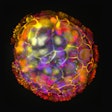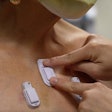
“Electronic skin” made from bio-friendly materials can accurately track human vital signs in real time, signaling new prospects for high-precision health diagnostics, say researchers.
Academics from two U.K. universities embarked on materials research inspired by concepts from molecular gastronomy which they say could “redefine the possibilities of wearable technologies.”
Dr. Dimitrios Papageorgiou, lecturer in materials science at Queen Mary University of London, and Dr. Conor Boland, lecturer in materials physics at the University of Sussex, told LabPulse.com about their hopes for the proof-of-concept work just published in Advanced Functional Materials.
“We’re trying to open up a broad range of applications but our real goal is to try and push this out of the lab so we can get some practical measurements out in the field,” Boland said.
Currently, few materials present the desired combination of high sensitivity and low mechanical stiffness required to measure minute bodily signals such as heart function accurately and unimpeded.
Most methods use solvent systems and polymer materials that are nonrecyclable and potentially harmful to the environment and human health on disposal.
The two U.K. research teams looked at whether a more sustainable approach could deliver as good if not better results than current options.
“The whole idea came from watching TV cookery show ‘Masterchef’ during lockdown,” Boland told LabPulse.com.
High-end restaurants serve a seaweed-based “caviar” formed of edible, biodegradable capsules with a liquified food core. Boland and colleagues added graphene to brown seaweed derivatives in a process known as spherification to create nanocomposite microcapsules with a liquid graphene ink core.
Unlike the molecular gastronomy capsules, the graphene capsules are very sensitive to pressure and when squeezed or compressed, their electrical properties change dramatically. When assembled into networks, the capsules formed the basis of discrete “smart skins” for bodily sensing, capable of recording muscular, breathing, pulse, and blood pressure measurements in real time with ultra-high precision, the academics found.
“By measuring the mechanical properties and the electrical properties we realized these materials could be utilized as very effective strain sensors. They were extremely soft; they could sense any changes in resistivity or conductivity,” Papageorgiou told LabPulse.com.
The researchers say they have enabled devices which were not only environmentally friendly but could also potentially outperform nonsustainable ones.
The use of recyclable and biodegradable materials could impact the way people think about wearable sensing devices and their effects, the academics said.
Sensor technology can be connected to a server and send signals to central services for doctors or other professionals to monitor patients without them needing to go to a physician or hospital.
When the U.K. researchers attached a <D> ≈ 290-µm microcapsule electronic skin to different locations on the body, they demonstrated that the device was “a highly sensitive diagnostic tool, measuring muscular movement, breathing, and pulse,” all in real time.
In pulse measurements, the characteristic systolic and diastolic peaks were observed.
“We have demonstrated that seaweed capsules with a graphene additive display a high level of property tunability,” Papageorgiou said. “This means we have a system that we can control—we can control the sensitivity, the diameter, the size of the devices.
“At this stage it’s not too difficult to create a large number of capsules; we have optimized the size of the capsules in order to maximize the sensitivity.”



















